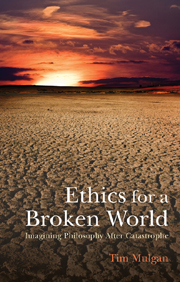Book contents
- Frontmatter
- Contents
- Acknowledgements
- Preface: Imagining a broken world
- Introductory lecture: Philosophy in the age of affluence
- Part I Rights
- Part II Utilitarianism
- Lecture 6 Act utilitarianism
- Lecture 7 Rule utilitarianism
- Lecture 8 Well-being and value
- Lecture 9 Mill on liberty
- Lecture 10 Utilitarianism and future people
- Lecture 11 Uilitarianism in a broken world
- Part III The social contract
- Part IV Democracy
- Reading list
- Bibliography
- Index
Lecture 8 - Well-being and value
from Part II - Utilitarianism
- Frontmatter
- Contents
- Acknowledgements
- Preface: Imagining a broken world
- Introductory lecture: Philosophy in the age of affluence
- Part I Rights
- Part II Utilitarianism
- Lecture 6 Act utilitarianism
- Lecture 7 Rule utilitarianism
- Lecture 8 Well-being and value
- Lecture 9 Mill on liberty
- Lecture 10 Utilitarianism and future people
- Lecture 11 Uilitarianism in a broken world
- Part III The social contract
- Part IV Democracy
- Reading list
- Bibliography
- Index
Summary
Affluent act utilitarians said that individuals should choose the act that maximizes human well-being. Rule utilitarians sought rules and institutions to maximize human well-being. Both had to decide what human well-being is, how it is measured and how we compare one person's well-being to another's. utilitarians were not alone here. Most affluent philosophers gave well-being some moral significance. Consider Nozick's proviso, where we ask whether his institution of property leaves future people better off. We can't answer this question unless we know what is good or bad for people.
We first introduce some terminology. Affluent philosophers often used other terms, such as “welfare” and “happiness”, but these had distracting connotations. Happiness suggested a preoccupation with pleasure, while welfare suggested a focus on money or health. Some went to the other extreme and spoke of “whatever makes life worth living”. That would prolong our lectures unnecessarily. As a compromise, I suggest the neutral term “well-being”.
While particular affluent views about well-being may be alien to us, the basic idea is familiar. We all think about well-being all the time: when we ask whether some parti cular experience will be good or bad; when you look back on your life and list the things that made it go well or badly; when you meet two people and ask who is better off ; when a friend seeks your advice on a major life choice, and you wonder what would be better for her; when you ask whether your life will go better if you become a lawyer or a philosopher.
- Type
- Chapter
- Information
- Ethics for a Broken WorldImagining Philosophy after Catastrophe, pp. 100 - 112Publisher: Acumen PublishingPrint publication year: 2011



